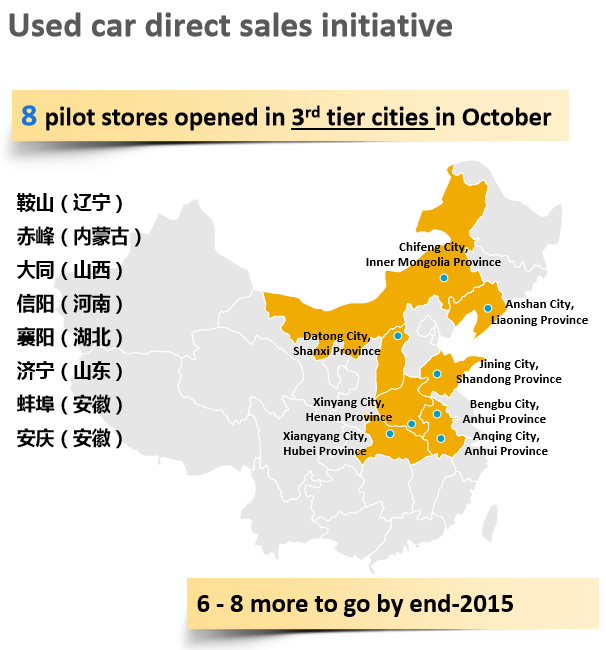ChinaTravelNews, Ritesh Gupta - The car rental market in China isn’t showing any uniformity, with the first- and second-tier cities depicting certain trends that are distinct from what is being witnessed in the third- and fourth-tier cities. So the players need to work out different tactics for different locations.

As auto mobility provider CAR Inc. shared its latest quarterly result, the company indicated that customers’ decision-making in the first- and second-tier cities is resulting in “disruption to car ownership”. Audience in these locations is increasingly getting used to car sharing.
At the same time, if one considers the third- and fourth-tier cities, car ownership continues to be a vital component of consumers’ lifestyle, and stepping up their living standards. This is mainly due to inadequate transportation infrastructure and mobility solutions. The company expects the overall demand for used cars to step up in these cities.
Evolving regulatory environment
Other than the current demand and preferences of customers, the players in this market also need to look at the evolving regulatory environment.
For instance, last month the National Ministry of Transportation issued draft rules to regulate online on-demand chauffeur services in China. CAR believes UCAR is strategically positioned to benefit from regulatory development and industry growth. It is being highlighted that UCAR isn’t featuring unlicensed private cars and crowd-sourced drivers to run its operations.
UCAR has contributed to the group’s financial performance after the association commenced in January this year. For its part, CAR intends to excel in both self-drive and on-demand chauffeured service markets. The plan is to set up an “intelligent mega fleet management platform” for auto mobility solutions. A major differentiator from UCAR’s business model perspective is offering of safe and standardized travel services. At the time of finalizing the Series B Preferred Shares subscription agreement with UCAR in September this year, the team at CAR did mention that among all chauffeured car service operators across the nation, only UCAR is ensuring drivers’ background and qualifications. Plus there is provision to track drivers’ behavior and promise privacy protection and quick compensation on accidents.
As of Q3, the company held 9.85% of the total issued and outstanding shares of UCAR.
Sustaining the momentum
The operating fleet was 86,423 vehicles as at 30 September 2015, compared with 58,773 vehicles at the end of last year.
CAR asserted that its one of the reasons behind its positive business performance was optimization of business mix.
In mid-2015, the company chose to optimize its corporate structure by setting up two independent business and functional platforms. The first one is focused on technology driven fleet management and financial services. And the other one is for online-to-offline (O2O) self-drive car rental and car sharing services. According to the company, not only short-term rentals performed as per expectations in Q3, the company is also witnessing better synergies in fleet sharing with on-demand chauffeured services.
Revenue from short-term rentals continues to show consistent growth.
If we compare the performance, revenue from short-term rentals increased by 35.9% from RMB 1,081.1 million for the six months ended 30 June 2014 to RMB 1,469.2 million for the six months ended 30 June 2015.
And for the first nine months of this year, it has increased by 35.4% year-over-year to RMB2,316.9 million.
The growing short-term rental fleet size along with stable RevPAC is contributing to this steady growth.
The company’s average daily rental revenue per short-term rental vehicle (RevPAC) was RMB175 for the January-September period. Utilization rate was 64.5% for the third quarter and 64.1% for the first nine months of this year.
As for other areas, the company has significantly increased the long-term rental vehicles for UCAR while strategically downsized the fleet size for traditional institutional customers.
Revenue from long-term rentals increased by 132.0% year-over-year to RMB816.6 million for the nine months.
Another highlight has been improving operating leverage.
For instance, selling and distribution expenses have been cut down by 13.7% from RMB64.5 million for the nine months last year to RMB55.7 million this year. As a percentage of rental revenue, selling and distribution expenses decreased from 3.0% to 1.7% for the January-September period.
This reduction was driven by brand recognition, increase of mobile transactions and greater operating leverage.
As we highlighted in August this year, as the chunk of revenue generation from the organization’s mobile app is going up, the company is succeeding in bringing down its selling and distribution expenditure, too.
Offline stores
The company took an important initiative in October, as it chose to open offline pilot stores in eight third-tier cities to build its own used car direct sales and service network.
The company intends to become the number B2C used car brand in China, and the team believes with its brand premium and value product offerings, the new move will help to realize “higher residual values, better manage full life cycle of rental vehicles and capture the growth potential in China’s used car market”.




